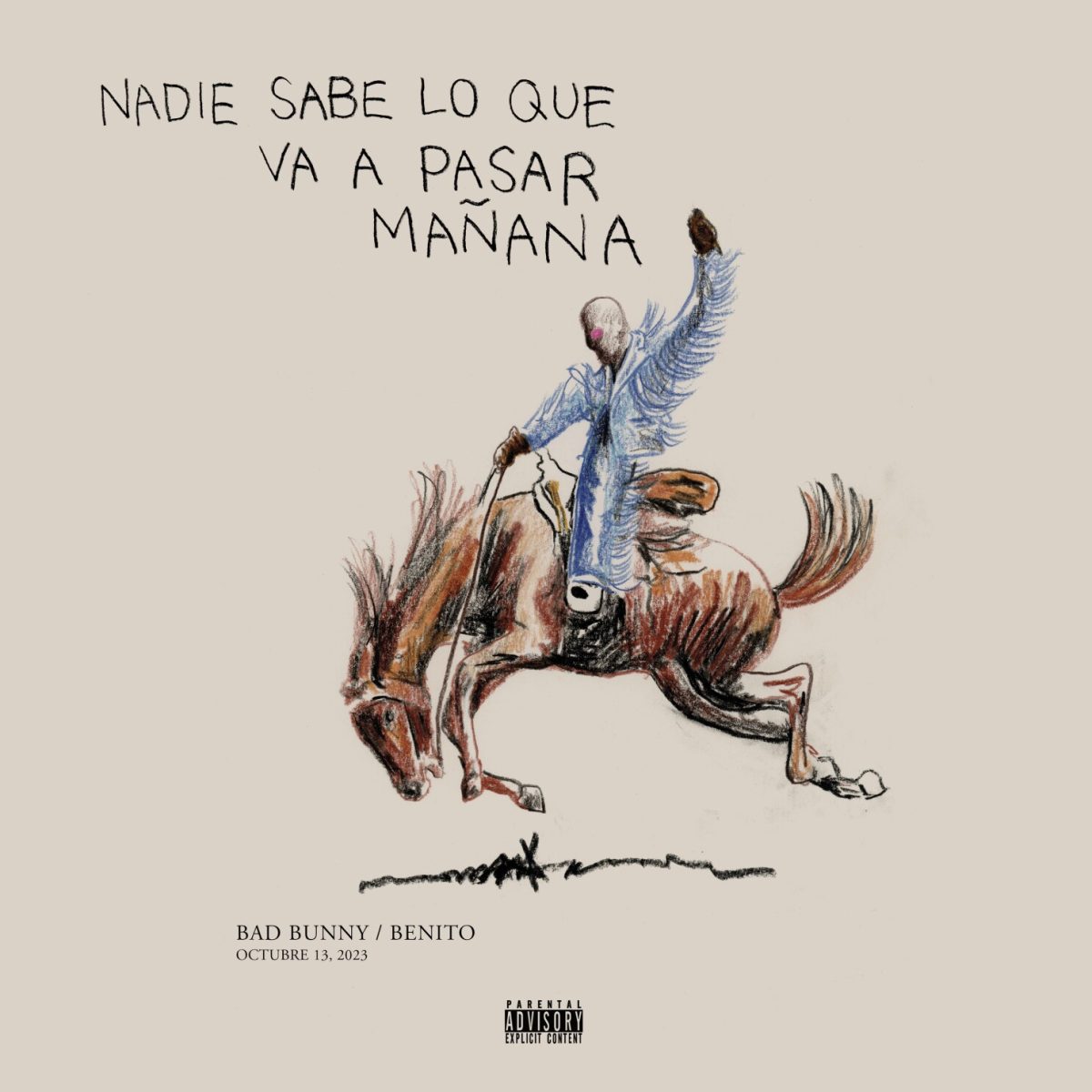No one knows what will happen tomorrow, which is certainly true of Bad Bunny’s latest album of the same name. Surprising fans with just four days of notice before the release, Spotify’s globally most streamed artist for the last three years dropped his fifth studio album. The 22-track “Nadie sabe lo que va a pasar mañana” became Spotify’s most streamed album in a single day in 2023, soaring to the top of the Billboard 200 chart of popular albums. With mostly hits and few misses, this album represents an overall triumphant return to Bunny’s Latin trap roots, using the lessons he learned over his meteoric rise to fame to create his most personal album yet.
Reggaeton fans might be most familiar with Bad Bunny’s last album, the record-breaking “Un Verano Sin Ti,” and would find this album to be a dramatic departure from the typical bouncing “dembow” rhythm and light, summer-vibes. With just two reggaeton tracks on this album, Bunny returns to Latin trap, a musical style that is a fusion of hip-hop and reggaeton that features darker, more aggressive lyrics and less danceable rhythms, according to BBC. Bunny’s first songs, released on SoundCloud just eight years ago, were heavily trap and helped build his success and fame, so this album feels like a tribute to his original work.
This is immediately evident in the over six-minute first track, “Nadie Sabe,” which is essentially a musical rant in which he swears to be true to himself as he basks in his fame and wealth at the expense of what anyone else thinks. With lyrics like “dejen de comparar, saben que soy aparte, disfruten y ya” [stop comparing, you know I’m apart, just enjoy it], it is clear that he is sitting comfortably in his position as “the biggest star in the world.” The best part of this song is its outro, where a soaring chorus joins him to whimsically proclaim “nadie sabe lo que va a pasar mañana […] por eso lo hago hoy” [no one knows what will happen tomorrow, that’s why I do it today]. This track felt like Bunny had a lot to get off his chest, and while not particularly musical, it served as an important window into the artist’s headspace to understand the rest of the album.
My favorite track on the album is “Monaco,” which was released as a music video starring Al Pacino (The Godfather) on the same day as the album. The beginning of the song contains a catchy old-timey string intro from “Hier Encore,” a song by the famed and recently deceased French singer Charles Aznavour, which then shifts into a blend of strings and trap beats. Lyrically, Bunny flaunts his newfound wealth, name-dropping many celebrities—Sofia Vergara, Lionel Messi, Lebron James—in connection to the greatness they share with him. I enjoyed this track the most because it’s one of the catchiest songs on the album by far and the nod to the late Aznavour is an excellent addition.
While this is Bad Bunny’s most honest and personal work, he still has several featured artists who are valuable additions to the track. “Fina” features the Puerto Rican rapper, Young Miko, who contributes immensely to the track with her fun style, adding her perspective as an out lesbian to a song about taking no shame in sex. Miko carries the song without Bad Bunny in the first half, forcing him to match her explosive energy when he jumps in towards the end.
“Mr. October” is another standout track on the album. The background is especially eerie, bringing to mind a haunted house as Bunny raps about how he could easily become a millionaire again if he wanted to. his song in particular leans into the spooky Friday the 13th vibe of the album’s release date.
If you’re realizing one of the downsides to the album, you’re right, it’s pretty repetitive. Sex, luxury, and fame (both the good and the bad sides) are this album’s central themes, all while Bunny gives the finger to his haters, and after a while, the songs can start blurring together. Some songs in the middle of the album have excellent tonal shifts, like “Baby Nueva” and “Gracias Por Nada” coming from a sadder Bunny as he recalls the wrongs of past lovers—but a lot of later songs aren’t as “fuego” [fire] as Bunny promised in his advertising. Making 22 songs that are all bangers is an ambitious undertaking for anyone, and Bunny admits that the album is not meant to get a “billón” views but rather to make his true fans happy.
Bunny fans will hopefully stay happy in the future thanks to the hints dropped in the last track on the album. “Un Preview,” a reggaeton song, gives a taste of things to come, implying that Bunny’s next album will contain more reggaeton, something that I look forward to. It is clear that Bad Bunny isn’t going anywhere, and will only continue to make fantastic music for himself as much as for his fans.




